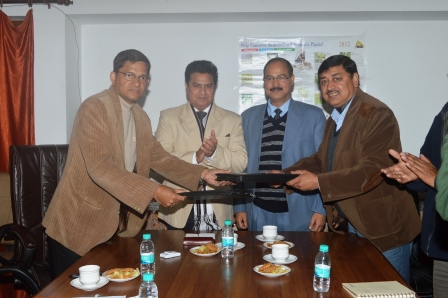- Skip to main content
- Screen Reader Access
- Skip to navigation
- Text Size
- Select Theme Default Theme Yellow Theme Pink Theme Blue Theme
- हिंदी में
- Biodiversity Conservation - An art of living with Nature***************Biodiversity Conservation - An art of living with Nature***************Biodiversity Conservation - An art of living with Nature**

- Home
- Recent Update
Recent Update
14-03-2014
Under Section/Module : Newwhats
Signing of Letter of Agreement (LoA) - Kailash Sacred Landscape Conservation & Development Initiative (KSLCDI)
Publish Date: 04-03-2014
4th March, 2014: A Letter of Agreement was signed today between representatives from the Uttarakhand Biodiversity Board (UBB) and the Govind Ballabh Pant Institute of Himalayan Environment and Development (GBPIHED). The Agreement defines the roles and responsibilities of both collaborators in the implementation of the activities of the Component 3 (Access and Benefit Sharing) of the Kailash Sacred Landscape Conservation and Development Initiative (KSLCDI) Programme in India.
The Kailash Sacred Landscape Conservation and Development Initiative (KSLCDI) is a programme initiated by the International Centre for Integrated Mountain Development (ICIMOD) in an effort to synergize the collaboration among the Nations of China, India and Nepal, working for the conservation and development of the vital landscape. The programme is focusing on five areas - Innovative Livelihoods, Ecosystem Management, Access and Benefit Sharing, Long-term Conservation and Monitoring, and Regional Cooperation, Enabling Policies and Knowledge Management. The Kailash Sacred Landscape (KSL) is an area encompassing over 31,000 km2 in a remote south-western portion of the Tibetan Autonomous Region (TAR) of China and adjacent area in India and Nepal. This region forms an ecosystem vital to millions of people in all three countries, being the source of four important rivers—Indus, Sutlej, Brahmaputra and Karnali, and is an essential habitat for a wide variety of flora and fauna, including several endangered species. As the landscape interlinks trans-boundary ecosystems, any disturbance to the ecosystem at any point impacts the entire KSL.
Govind Ballabh Pant Institute of Himalayan Environment and Development (GBPIHED) is an autonomous institute of the Ministry of Environment and Forests (MoEF), Government of India. This institute is the lead institution for the implementation of Kailash Sacred Landscape Conservation and Development Initiative (KSLCDI) Programme in India. The Nodal Officer for this project is Dr. Ranbeer S. Rawal, Scientist, GBPIHED.
Uttarakhand Biodiversity Board (UBB) is a collaborator with this project, responsible for the implementation of the Access and Benefit Sharing (ABS) component of the project.
Dr. Ranbeer S. Rawal delivered a presentation introducing the KSLCDI Programme and its components and discussed the details of the Agreement on the Component 3 (Access and Benefit Sharing) between the two organizations. Letters of Agreement (LoA) were exchanged between Mr. G.S. Pande, Member Secretary, Uttarakhand Biodiversity Board and Dr. R.S. Rawal, Scientist, GBPIHED & Nodal Person KSLCDI in the august presence of Dr. Rakesh Shah, Chairman, Uttarakhand Biodiversity Board, Dr. P.P. Dhyani, Director, GBPIHED, Mr. Manoj Chandran, Additional Secretary, Forests, Government of Uttarakhand. Mr. Dhananjay Prasad, Deputy Director, Uttarakhand Biodiversity Board, Dr. S.K. Shrivastava, Deputy Director and Head, Botanical Survey of India, Dehradun, Mr. M.S. Tomar, Deputy Director, Agriculture, Uttarakhand, Dr. Sandeep Rawat, Joint Director (Planning), Animal Husbandry Department, Uttarakhand, Dr. Kishore Nautiyal, Executive Director, SAMVEDI, Dehradun, and Dr. Ramesh C. Uniyal, Consultant – MAPs under UNDP-GEF Project, SMPB, Dehradun and Dr. Badrish Singh Mehra, Coordinator, KSLCDI – GBPIHED were also present on the occasion.
The programme concluded with a vote of thanks from the Chairman, Uttarakhand Biodiversity Board followed by a Question & Answer session with the print media. Dr. Rakesh Shah explained the details of the Access and Benefit Sharing provisions and the Biological Diversity Act, 2002 and the Rules made thereunder.
- 04-08-2022 - INVITATION FOR SUBMITTING THE REQUEST FOR PROPOSAL (RFP) (Under Section/Module :Tenders)
- 05-01-2022 - Notice related ACF (Under Section/Module :Notices)
- 07-10-2021 - Citizen Charter (Under Section/Module :Top Menu)
- 02-09-2021 - Notice For Compliance (Under Section/Module :Notices)
- 18-03-2020 - Muduga leaping frog is first new member of its genus found in over a century (Under Section/Module :News)
- 21-08-2019 - Tigers are vanishing outside protected areas in the northeast (Under Section/Module :News)
- 07-08-2019 - India's ghost villages: Food and water scarcity forcing many to leave (Under Section/Module :News)
- 07-08-2019 - India to set voluntary target to combat land degradation (Under Section/Module :News)
- 29-07-2019 - [Interview] “Addressing climate change and biodiversity loss is in India’s best economic and developmental interests” (Under Section/Module :News)
- 16-07-2019 - Indian steelmakers face water issues (Under Section/Module :News)
- 10-07-2019 - India joins the Climate and Clean Air Coalition (Under Section/Module :News)
- 05-07-2019 - International Biodiversity Award 2020 (Under Section/Module :News)
- 28-06-2019 - 2019 Global Youth Video Competition Now Open for Applications (Under Section/Module :News)
- 14-06-2019 - [Commentary] Why is marine conservation still an unchartered zone? (Under Section/Module :News)
- 29-04-2019 - India’s water crisis is already here. Climate change will compound it. (Under Section/Module :News)
- 26-03-2019 - Assam’s rhino habitat overtaken by invasives (Under Section/Module :News)
- 25-03-2019 - If India's Rivers Had Rights (Under Section/Module :News)
- 15-03-2019 - More than 7000 new marine species discovered; Will help to develop new drugs (Under Section/Module :News)
- 15-03-2019 - New species of frog sheds light on major biodiversity hotspot in southern India (Under Section/Module :News)
- 13-03-2019 - Invitation for application regarding selection of Chair person Uttarakhand State Biodiversity Board (Under Section/Module :Recruitments)





